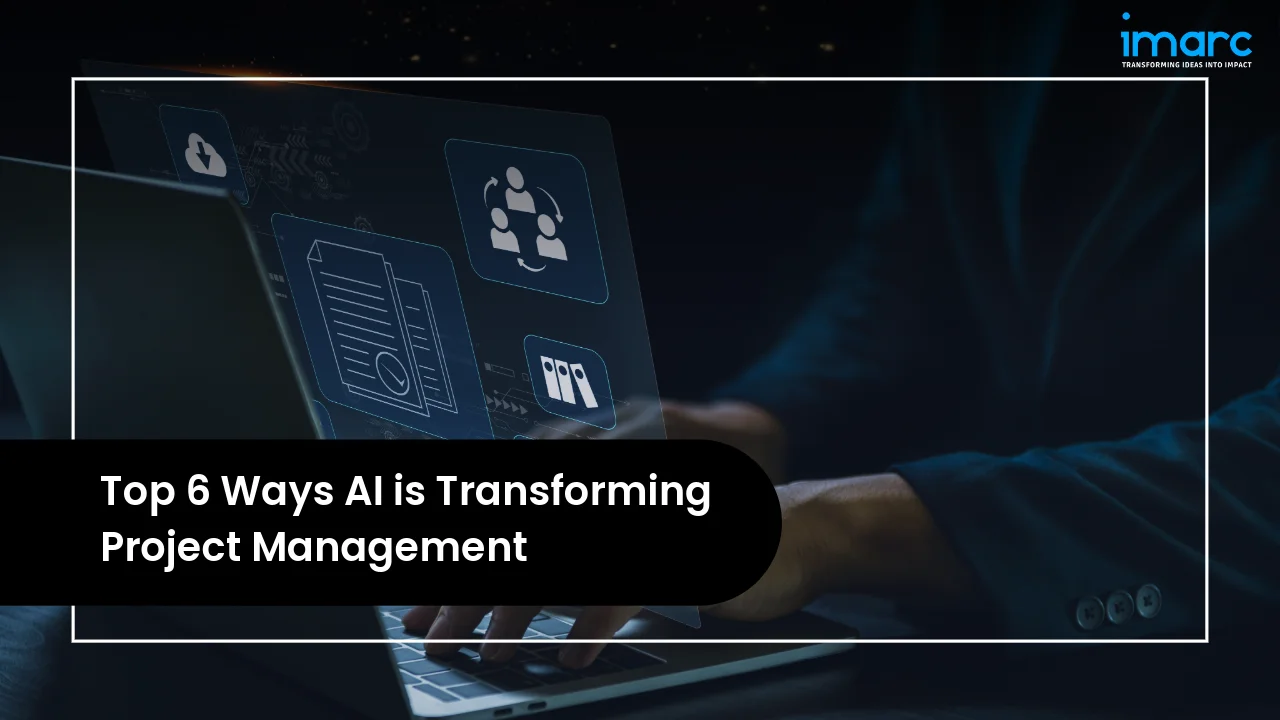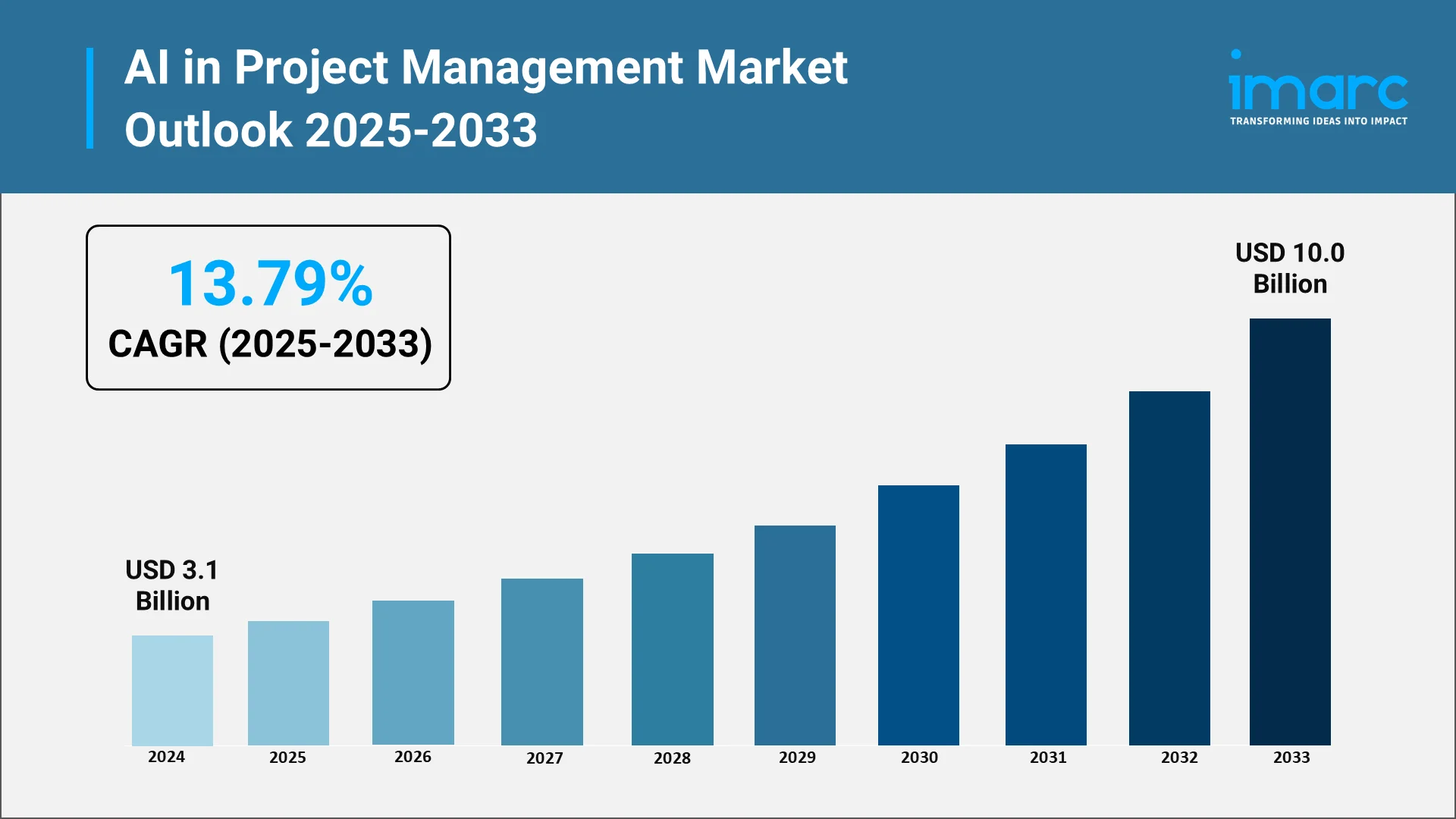Top 6 Ways AI is Transforming Project Management

Introduction: The Role of AI in Modern Project Management
The role of artificial intelligence (AI) in modern project management has transitioned from a theoretical concept to a strategic imperative. As businesses navigate increasingly complex projects in a data-driven world, AI is emerging as a powerful force for efficiency, accuracy, and innovation. The AI in project management market is expanding at a remarkable pace, driven by a universal need to improve project success rates, optimize resource utilization, and enhance real-time decision-making.
According to market report by IMARC, the global AI in project management market was valued at USD 3.1 Billion in 2024 and is projected to reach USD 10.0 Billion by 2033, demonstrating a robust compound annual growth rate (CAGR) of 13.79% during 2025-2033. This substantial growth reflects the increasing enterprise demand for intelligent automation, predictive analytics, and enhanced collaboration tools. AI has emerged as a transformative force, fundamentally changing the dynamics of how projects are initiated, planned, executed, and monitored. For instance, in August 2024, Zoom Video Communications launched Zoom Docs, an AI-driven collaborative document solution designed to enhance productivity within Zoom Workplace. Powered by the Zoom AI Companion, it transforms meeting content into actionable documents, streamlines collaboration, and supports project planning, all included at no extra cost for paid users.

Explore in-depth findings for this market, Request Sample
Automating Routine and Repetitive Tasks:
One of the most immediate and visible applications of AI in project management is automation. Through natural language processing, machine learning algorithms, and robotic process automation, AI can handle administrative responsibilities with accuracy and speed. Smart assistants embedded in AI project management software automatically generate weekly reports, update dashboards in real time, and send proactive notifications to teams about pending deadlines, ensuring better visibility and improved project efficiency. As a result, managers are free to focus on higher-value strategic responsibilities, such as stakeholder engagement, innovation, and risk mitigation.
The ability to automate repetitive workflows improves productivity and reduces the likelihood of errors. By minimizing manual intervention in routine activities, AI ensures data consistency and reduces operational fatigue. This marks a critical shift in project culture—from teams that are task-driven to teams that are strategy-driven.
Enhancing Predictive Analytics for Risk Management:
Project success often depends on the ability to anticipate and mitigate risks before they escalate. Traditional risk management relies heavily on past experiences, manual tracking, and qualitative judgments. While useful, these approaches are limited in predicting the multifaceted risks of today’s interconnected business environments. AI addresses this gap by introducing predictive analytics.
By analyzing historical data, industry benchmarks, and real-time project information, AI systems can identify patterns that signal potential risks—such as delays, budget overruns, or resource shortages. Predictive models highlight risk probabilities and suggest preventive measures, enabling managers to act before risks materialize. For instance, in February 2025, Foresight launched an AI-enabled project management platform designed for data center construction, allowing for accelerated project timelines and reduced risks. The software integrates with tools like Oracle Primavera P6 and Microsoft Project, providing features such as early issue detection and real-time insights, ultimately optimizing project delivery and governance.
This transition from reactive to proactive risk management enhances project resilience. Managers gain the ability to simulate various “what-if” scenarios and evaluate outcomes under different conditions. Such foresight reduces uncertainties and builds confidence among stakeholders, who increasingly expect projects to be delivered on time, within scope, and on budget.
Optimizing Resource Allocation and Scheduling:
Effective resource management has always been a cornerstone of project success. With teams often dispersed across geographies and working in hybrid models, aligning the right resources with the right tasks at the right time is more complex than ever. For instance, in September 2024, Oracle NetSuite announced the launch of SuiteProjects Pro, an AI-powered project management extension. This solution enhances resource allocation, accelerates planning, and improves productivity. Key features include AI-driven risk analysis and staffing recommendations, aimed at optimizing project efficiency and meeting business goals. Availability is expected within the next year.
AI project management tools can analyze employee skill sets, workload capacity, availability, and performance history to recommend optimal task assignments. Unlike manual scheduling, which can be prone to bias or incomplete data, AI considers multiple variables simultaneously. This ensures that resources are allocated not just efficiently, but strategically. For instance, critical tasks may be assigned to high-performing employees while repetitive tasks are automated or delegated appropriately.
Moreover, AI helps balance workloads, preventing employee burnout by monitoring capacity and distributing tasks equitably. It also allows project managers to simulate scenarios, such as shifting timelines or adding new deliverables, to determine the best resource strategies under varying conditions. These capabilities transform resource planning into a dynamic, data-driven process that adapts to real-time project demands.
Improving Real-Time Project Tracking and Updates:
Transparency and visibility are essential for modern project governance. In many traditional systems, project updates rely on periodic reporting, which can be delayed and may not fully capture evolving circumstances.
AI-powered platforms gather data from multiple sources—communication tools, task trackers, financial systems—and consolidate them into unified dashboards. Project managers gain a comprehensive view of progress, potential delays, and bottlenecks at any given moment. Intelligent alerts notify teams when milestones are at risk or when resources are under-utilized, enabling immediate corrective action. For instance, in March 2025, Zoho Corporation introduced Projects Plus, a sophisticated project management platform tailored for mid-sized and large organizations. It integrates key Zoho applications, enhancing collaboration and data-driven decision-making. With features like progress tracking and predictive analytics, Projects Plus aims to streamline operations and optimize project delivery efficiency.
Leveraging AI task management, this continuous feedback loop enhances accountability and builds trust among stakeholders. Real-time visibility minimizes surprises, enabling organizations to respond swiftly to changes. Moreover, predictive tracking goes beyond current progress, providing forward-looking insights that make reporting both descriptive and strategic.
Boosting Team Collaboration and Communication:
In today’s interconnected world, projects often involve cross-functional teams working across diverse geographies and time zones. Effective collaboration and communication are crucial to ensure alignment and cohesion. AI significantly strengthens these aspects by streamlining information flow and enhancing accessibility.
AI-enabled tools can summarize long conversations, highlight action items, and ensure critical updates are shared with the right stakeholders. Intelligent chatbots respond to routine queries, allowing teams to access project information instantly without waiting for human intervention. This reduces communication bottlenecks and ensures consistency across distributed teams.
Furthermore, AI improves knowledge management. By categorizing documents, conversations, and historical project data, it creates a searchable repository of organizational intelligence. Teams can quickly retrieve lessons learned, templates, or relevant case studies, ensuring knowledge is preserved and applied effectively. These capabilities foster a culture of continuous learning and collaboration, directly contributing to higher project success rates.
Driving Cost Savings and Operational Efficiency:
Cost efficiency is a central objective of project management. Projects often fail due to escalating budgets and inefficient resource utilization. AI directly addresses these concerns by driving operational efficiency across multiple dimensions.
Automation reduces labor hours spent on repetitive tasks, while predictive analytics minimizes costly risks such as schedule overruns. Optimized resource allocation ensures that talent is used effectively, avoiding both under-utilization and over-expenditure on external hires. AI-enabled procurement tools also identify the most cost-effective suppliers and anticipate price fluctuations, contributing to more efficient financial management.
Beyond direct cost savings, AI enhances long-term organizational efficiency. By delivering projects more consistently on time and within budget, companies build stronger reputations, improve client satisfaction, and unlock additional opportunities. These strategic gains highlight AI as a cost-reduction tool and an enabler of sustainable growth and competitiveness.
How IMARC Group is Shaping Innovation in Project Management:
IMARC Group supports organizations navigating the rapidly evolving landscape of AI-driven project management by delivering strategic insights and tailored solutions. As projects become more complex and time-sensitive, our expertise empowers stakeholders to identify opportunities, manage risks, and accelerate innovation across industries. We achieve this through:
- Market Insights: We analyze global trends shaping AI adoption in project management—such as the automation of repetitive workflows, rising investment in predictive analytics, and growing demand for intelligent scheduling solutions. Our assessments highlight how emerging technologies are being deployed in areas like collaborative platforms, hybrid workforce management, and AI-driven dashboards.
- Strategic Forecasting: By examining critical developments—including the rise of agentic AI, expanding integration of advanced analytics, and the demand for real-time project intelligence—we provide forward-looking forecasts that help organizations anticipate change. These insights enable project leaders to prepare for the future, adapt to evolving business needs, and make informed decisions.
- Competitive Intelligence: IMARC Group monitors advancements in project management tools and platforms, from new AI-enabled resource allocation features to embedded collaboration assistants. We evaluate industry innovations such as predictive risk management, generative AI for project documentation, and AI-powered governance frameworks—helping clients understand how competitors are evolving in an increasingly automated environment.
- Policy and Regulatory Analysis: As regulatory landscapes shift to address AI and data governance, we provide in-depth analysis of compliance implications for project delivery. From emerging AI governance frameworks to data privacy requirements, our research supports organizations in aligning policies, pricing models, and risk management strategies with evolving standards.
- Customized Consulting Solutions: Whether enhancing AI adoption strategies, improving operational efficiency, or responding to regulatory shifts, our consulting services are tailored to organizational goals. From resource optimization to digital transformation roadmaps, we enable clients to integrate AI seamlessly into project lifecycles and remain competitive in a rapidly changing environment.
With the AI in project management market expanding at significant rate, IMARC Group continues to be a trusted partner—delivering data-driven insights, guiding innovation, and enabling strategic decisions that shape the future of project delivery. or detailed insights, data-driven forecasts, and strategic advice, see the complete report here: https://www.imarcgroup.com/ai-in-project-management-market
Our Clients
Contact Us
Have a question or need assistance?
Please complete the form with your inquiry or reach out to us at
Phone Number
+91-120-433-0800+1-201-971-6302
+44-753-714-6104
.webp)










